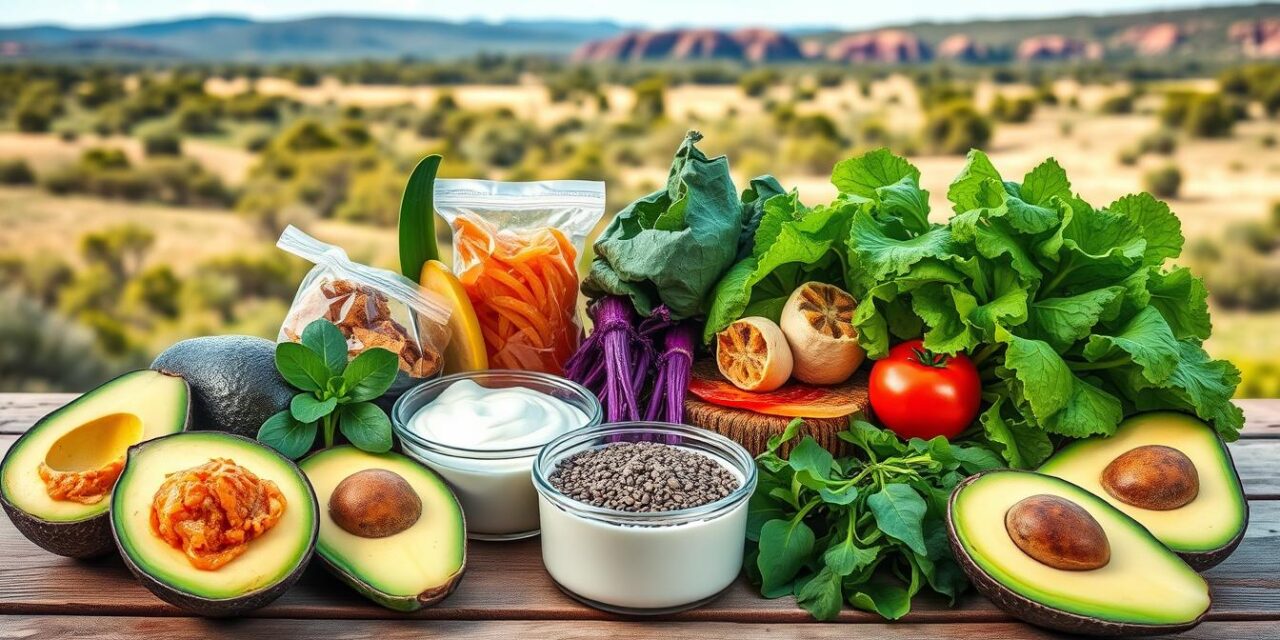Did you know that the average Australian adult has over 100 trillion gut bacteria? These tiny creatures are key to our health and wellbeing. Eating the right foods can boost digestion, strengthen immunity, and clear your mind.
Key Takeaways
- Gut health is crucial for overall physical and mental wellbeing
- A diverse gut microbiome is essential for optimal digestion and immune function
- Eating a variety of gut-friendly foods can help nurture beneficial gut bacteria
- Probiotic-rich and high-fibre foods are particularly important for gut health
- Incorporating anti-inflammatory and omega-3 rich foods can also support the gut
This guide looks at the best foods for gut health in Australia. It explains why a balanced gut is important and offers tips for better digestion.
Understanding the Gut Microbiome and Its Impact on Overall Health
The gut microbiome is a complex system of trillions of bacteria in our digestive system. It plays a key role in our health and wellbeing. Keeping this balance can greatly affect our mental and physical health.
How Gut Bacteria Affects Mental and Physical Wellbeing
Research shows a strong link between the gut microbiome and our health. The gut-brain axis lets gut bacteria influence our brain, mood, and thinking. A healthy gut is linked to reduced risk of depression, anxiety, and other mental health conditions.
On the physical side, the gut microbiome helps with immune function, nutrient absorption, and metabolism. This leads to a strong immune system, better weight management, and less inflammation.
The Role of Diet in Maintaining Gut Health
Eating a diet rich in gut microbiome, healthy gut bacteria, and gut-friendly foods is key. Eating a variety of plant-based foods like fruits, vegetables, and whole grains feeds the good bacteria. Adding probiotic-rich foods like yogurt, kefir, and kimchi helps support the gut microbiome.
“A healthy gut is the foundation for overall wellbeing. By nourishing our gut with the right foods, we can unlock the vast potential of our gut microbiome and experience the benefits across physical and mental health.”
The Best Food List for Gut Health: Australian Guide
Keeping your gut healthy is key to feeling good. Australians have access to many local foods that are great for the gut. This guide will show you the best foods to help your gut stay healthy.
Adding probiotic-rich foods to your diet is a smart move. Yogurt and kefir are full of good bacteria that balance your gut. Kimchi and sauerkraut, fermented veggies, are also good choices and loved in Australia.
Don’t forget about prebiotic foods that feed the good bacteria in your gut. Eat whole grains, ancient seeds, leafy greens, and lots of Australian fruits and vegetables. They give your gut the energy it needs to stay healthy.
| Top Gut-Friendly Foods for Australians | Key Benefits |
|---|---|
| Yogurt, Kefir | Probiotic-rich, supports gut flora |
| Kimchi, Sauerkraut | Fermented, contain beneficial bacteria |
| Whole Grains, Ancient Seeds | Prebiotic-rich, feed gut microbiome |
| Leafy Greens, Australian Produce | High in fiber, nourish gut health |
By focusing on these gut-friendly foods, Australians can keep their gut health in top shape. Enjoying a gut-friendly diet brings many benefits.
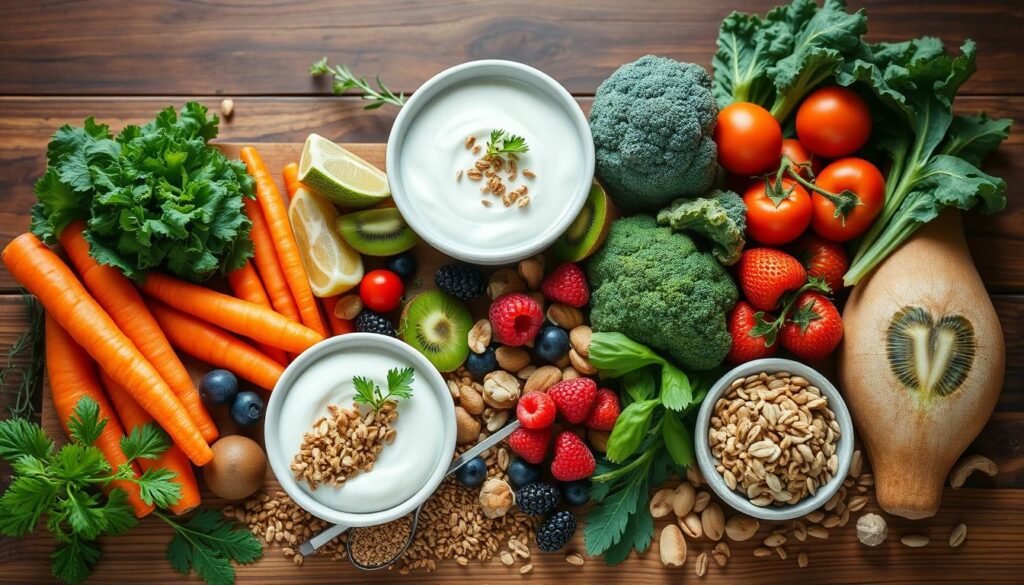
Probiotic-Rich Foods: Natural Sources for Gut Flora
Keeping your gut healthy is key, and probiotic-rich foods are a must. These foods are full of good bacteria that help your body stay well. Luckily, you can find many probiotic sources in Australia.
Benefits of Yogurt and Kefir
Dairy products like yogurt and kefir are great for your gut. They have live cultures that keep your gut balanced. Yogurt is easy to add to your day, and kefir is a tangy, bubbly option.
Fermented Vegetables: Kimchi and Sauerkraut
Fermented vegetables are also packed with probiotics. Kimchi and sauerkraut are becoming more popular in Australia. They’re made from fermented cabbage and veggies, offering lots of nutrients for your gut.
Traditional Australian Fermented Foods
Australia has its own fermented foods that are good for your gut. Vegemite is a spread that’s full of probiotics. Also, some native Australian bush foods like bushman’s bread and quandong have probiotic benefits.
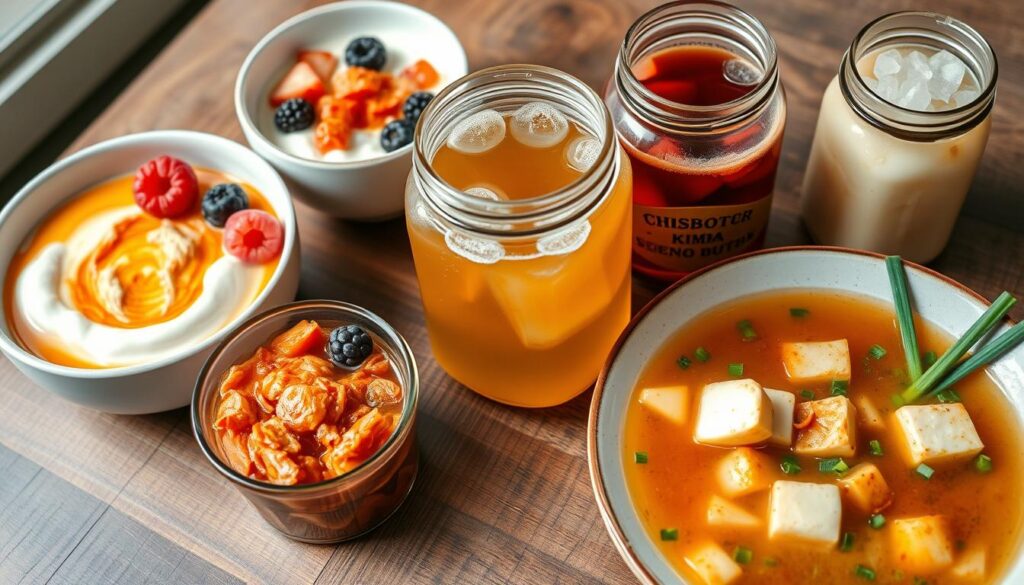
“Incorporating a variety of probiotic-rich foods into your diet is a simple yet effective way to support your gut health and overall wellbeing.”
Prebiotic Foods That Feed Your Beneficial Bacteria
Keeping your gut healthy is key to feeling good. Prebiotic foods are vital for feeding the good bacteria in your stomach. These foods are high in dietary fibre, which acts as food for the good bacteria in your gut.
By adding prebiotic-rich foods to your meals, you help your gut-friendly bacteria grow. This leads to a balanced and diverse mix of gut flora.
Many foods in Australia are packed with prebiotics. Here are some of the best ones:
- Onions – They’re full of inulin, which feeds the good Bifidobacteria in your gut.
- Garlic – It also has inulin, helping to nourish the probiotic bacteria.
- Bananas – They contain resistant starch, a prebiotic that helps your gut health.
- Oats – Oats are rich in beta-glucan, which supports Lactobacillus and Bifidobacterium strains.
- Legumes – Beans, lentils, and chickpeas are full of prebiotics like galacto-oligosaccharides (GOS).
- Whole wheat – The bran and fibre in whole grains provide prebiotics for your gut microbes.
Eating these prebiotic-rich foods helps your gut bacteria thrive. This supports your digestive and immune health. A healthy gut microbiome is essential for a strong body.
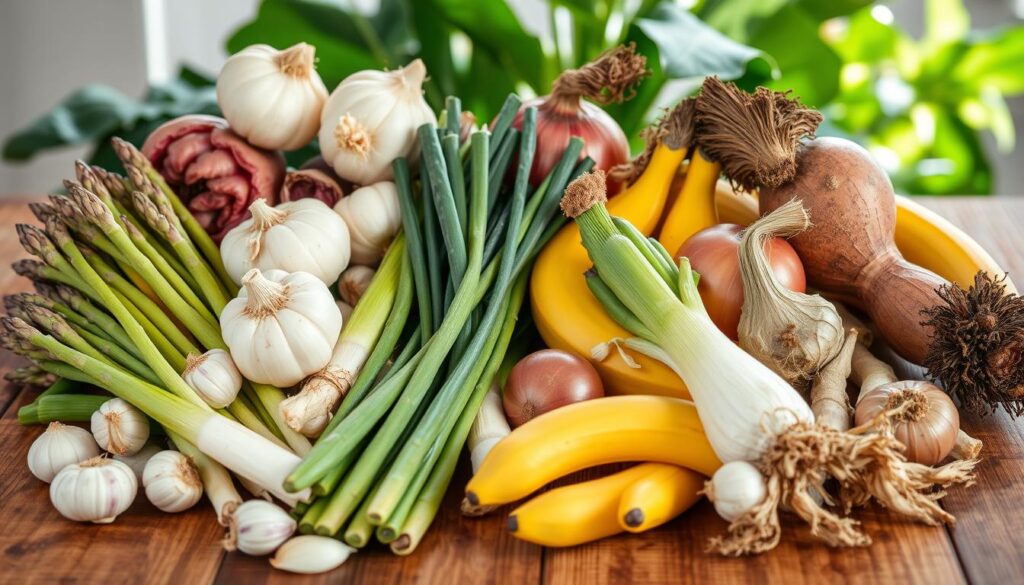
High-Fibre Foods for Optimal Digestive Health
Keeping your gut healthy is key to feeling good. Eating enough fibre is a big part of this. Foods high in fibre help the good bacteria in your gut and keep your bowels regular. Here are the top foods to add to your diet for a healthy gut.
Whole Grains and Ancient Seeds
Oats, brown rice, quinoa, and barley are full of fibre. They feed your gut and give you important vitamins and minerals. Adding whole grains to your meals is an easy way to get more fibre and keep your digestive system healthy.
Leafy Greens and Vegetables
Leafy greens like spinach, kale, and Swiss chard are fibre powerhouses. They’re also full of prebiotic fibre, which feeds the good bacteria in your gut. Eating a variety of fresh vegetables can really help your gut health.
Fresh Australian Produce for Gut Health
Australians have access to lots of fresh, fibre-rich produce. From broccoli, carrots, and zucchini to avocados, berries, and citrus fruits, these Australian-grown foods are great for your gut health.
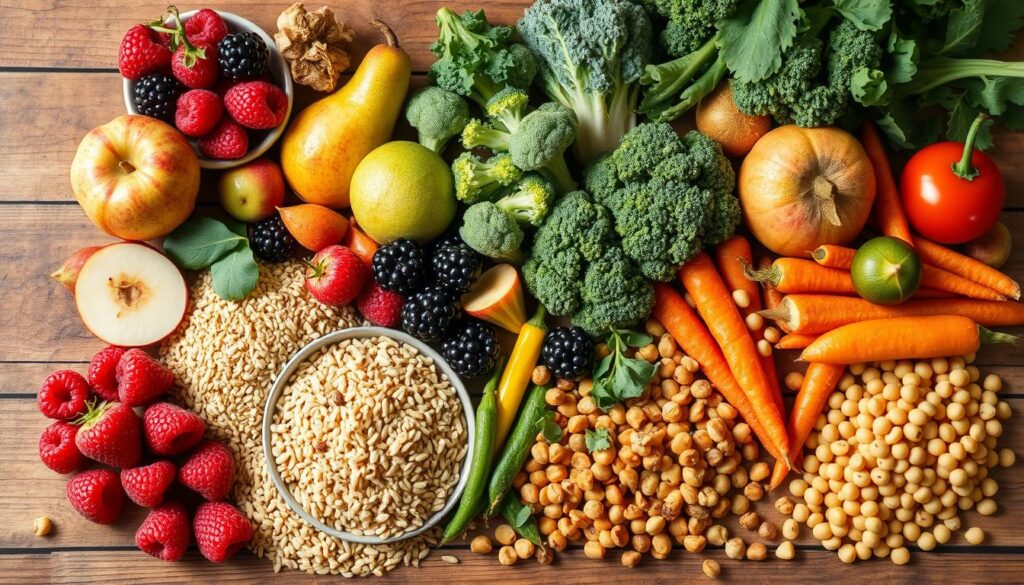
“A healthy gut is the foundation for overall well-being. By making nutrient-dense, fibre-rich foods a staple in your diet, you can nourish your gut and support your body’s natural functions.”
Anti-inflammatory Foods and Their Gut Benefits
Keeping your gut healthy is key to feeling good. Eating foods that fight inflammation is a great way to do this. These foods are full of nutrients and help your gut bacteria grow, making your diet better for your gut.
Turmeric is a standout food for fighting inflammation. It’s a bright yellow spice with a compound called curcumin. Curcumin is very good at reducing inflammation in your gut.
Ginger is another food that’s good for your gut. It’s been used for ages to help with digestion and lower inflammation. You can eat it raw, make tea with it, or take supplements.
Leafy greens like kale, spinach, and Swiss chard are also great for your gut. They’re packed with antioxidants and fiber. These help keep your gut healthy and reduce inflammation.
| Anti-inflammatory Food | Gut-Friendly Benefits |
|---|---|
| Turmeric | Reduces inflammation, promotes beneficial gut bacteria |
| Ginger | Aids digestion, reduces inflammation |
| Leafy Greens | Rich in antioxidants and fiber, supports a healthy gut microbiome |
| Fatty Fish | Provides anti-inflammatory omega-3 fatty acids |
| Berries | High in antioxidants, may reduce gut inflammation |
Eating these foods can help keep your gut healthy. A healthy gut is the base for feeling your best. So, adding anti-inflammatory foods to your diet is a smart move for your health.
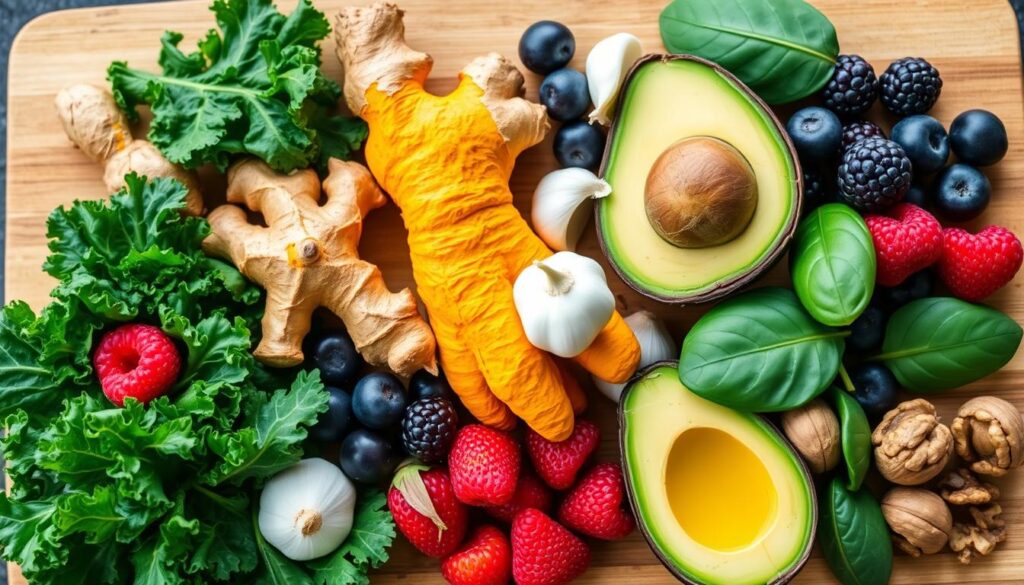
“A healthy gut is the key to a healthy life. Incorporating anti-inflammatory foods into your diet is a simple yet powerful way to support your digestive system and overall well-being.”
Essential Omega-3 Sources for Digestive Wellness
Keeping your gut healthy is key for feeling good. Omega-3 fatty acids are important for this. They help your heart and keep your gut balanced, reducing inflammation.
Fatty Fish Options in Australian Waters
Australia’s seas are full of omega-3 rich fish. Salmon, mackerel, and sardines are great for EPA and DHA. Eating these fish supports good gut bacteria and fights inflammation.
Plant-Based Omega-3 Alternatives
If you like plant-based foods, there are good options. Chia seeds, flaxseeds, and walnuts have ALA, which your body can turn into EPA and DHA. These foods are easy to add to many dishes, like smoothies and baked goods.
Choosing both fish and plant-based omega-3s helps your gut and overall health. A balanced diet with these nutrients is key for wellness in Australia.
| Omega-3 Source | Gut Health Benefits | Availability in Australia |
|---|---|---|
| Salmon | Reduces inflammation, supports gut microbiome | Widely available in coastal regions |
| Chia seeds | Prebiotic effects, supports healthy digestion | Commonly found in health food stores and supermarkets |
| Walnuts | Anti-inflammatory properties, promotes gut diversity | Readily available in most Australian markets |
A gut-friendly diet with various omega-3 fatty acids is vital for a healthy gut health Australia. Adding these nutrients to your meals supports your gut-friendly diet and well-being.

Gut-Healing Herbs and Spices
In Australia, herbs and spices are becoming key players in gut health. They’re seen as natural allies for a healthy digestive system. This is part of the growing interest in wellness and natural remedies.
Turmeric is a standout for its gut-healing powers. This bright yellow spice is packed with curcumin. It’s known for its anti-inflammatory and antimicrobial effects. Adding turmeric to your meals or taking it as a supplement can ease digestive issues and support a balanced gut.
Ginger is another herb that’s great for the gut. It’s a common ingredient in Australian cooking, known for easing nausea, reducing inflammation, and improving digestion. Enjoy ginger in tea, stir-fries, or as a fresh garnish to boost your gut health.
- Fennel: This licorice-flavored herb contains compounds that can help reduce bloating and ease digestive discomfort.
- Peppermint: The menthol in peppermint has a soothing effect on the gut, making it a popular choice for relieving symptoms of irritable bowel syndrome (IBS).
- Cinnamon: This warming spice has been shown to possess antimicrobial properties, which can help maintain a healthy balance of gut bacteria.
Adding these gut-friendly herbs and spices to your meals can boost your gut health. Discover the flavors and benefits they offer for a healthier gut in Australia.

Conclusion: Building Your Gut-Friendly Meal Plan
Starting a journey to a healthier gut means adding a variety of gut-friendly foods to your meals. This article has given you a guide to make a diet that’s good for your gut and overall health.
Begin by filling your pantry and fridge with foods rich in probiotics like yogurt, kefir, and fermented veggies. These foods are full of good bacteria that help your gut stay healthy. Add prebiotic foods like whole grains, leafy greens, and Aussie produce to feed your gut bacteria.
A diet that’s balanced and includes anti-inflammatory foods and omega-3s is key for a healthy gut. Eat a variety of fatty fish, nuts, seeds, and herbs to keep your gut inflammation down. With a bit of planning, you can easily add these foods to your meals every day.
